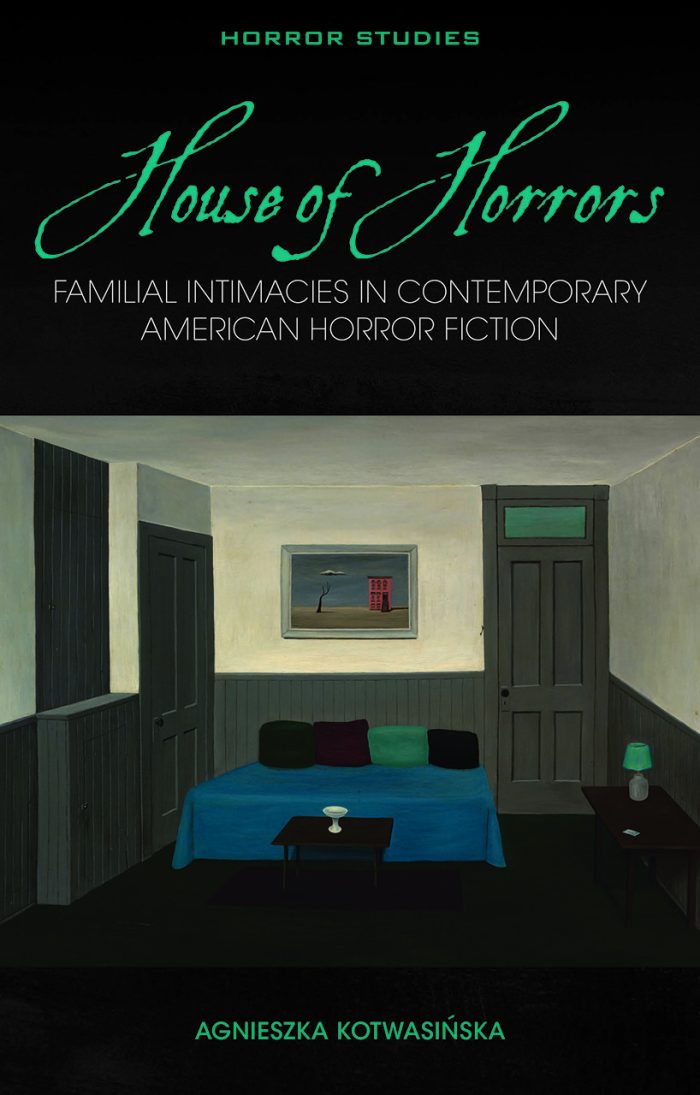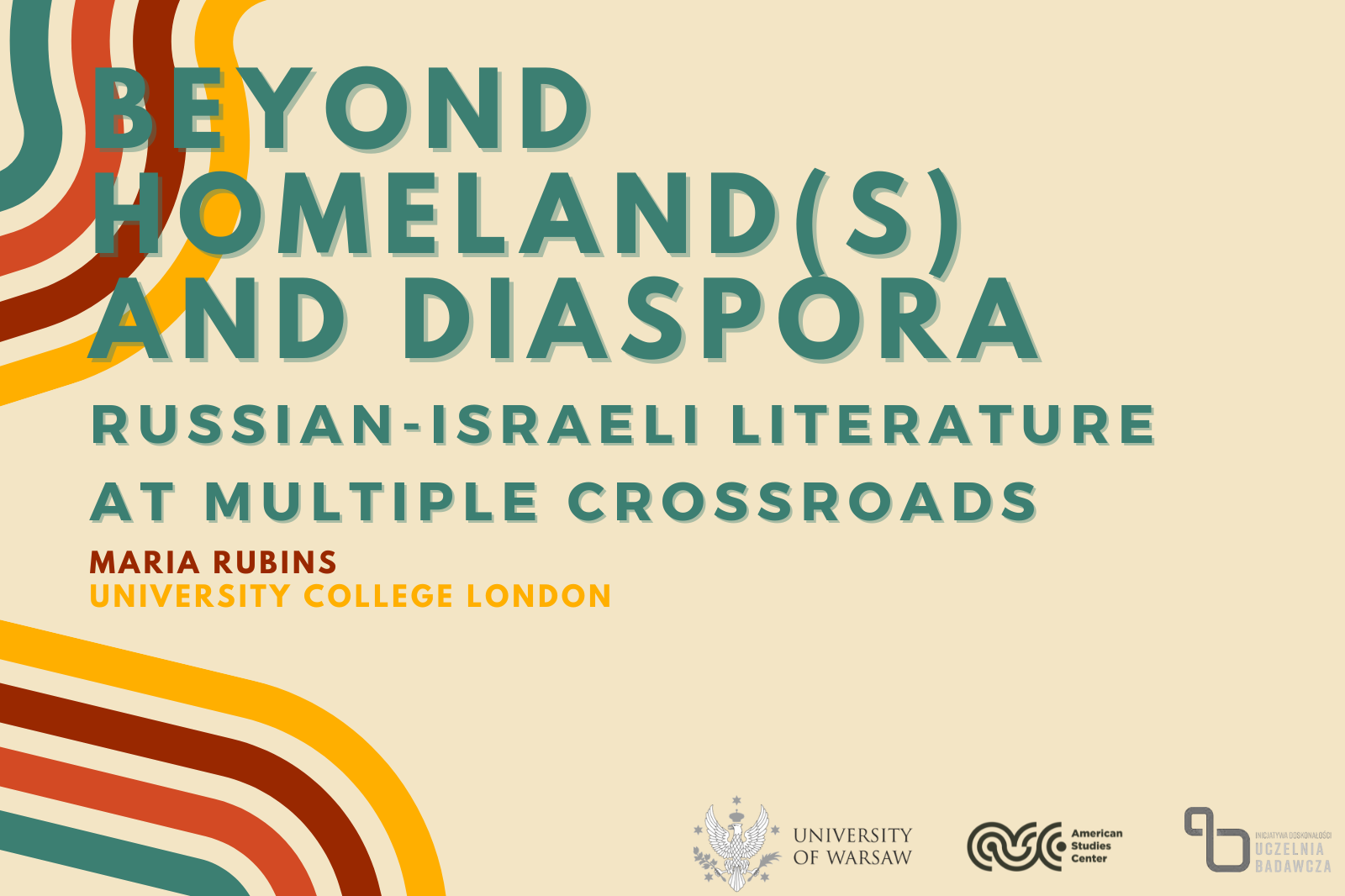Join us on November 21, 2024 for an author’s meeting with Dr. Agnieszka Kotwasińska about her book “House of Horrors: Familial Intimacies in Contemporary American Horror Fiction” published last year by the University of Wales Press. Dr. Kotwasińska will be joined by Dr. Sorcha Ní Fhlainn, and the event will be moderated by Dr. Jędrzej Burszta.
Thursday, November 21, 2024
16:45 PM
You can get 3 OZN points for participating in this event.
Where?
Dobra 55, room: 2.118
(the building features some mobility accommodations: ramp and lift)

What?
Dr. Kotwasińska’s monograph is a study of tumultuous transformations of kinship and intimate relationships in American horror fiction over the last three decades. Twelve contemporary novels (by ten women writers and two whose work has been identified as women’s fiction) are grouped into four main thematic clusters – haunted houses; monsters; vampires; and hauntings – but it is social scripts and concerns linked directly to intimacy and family life that structure the entire volume. By drawing attention to how the most intimate of all social relationships – the family – supports and replicates social hierarchies, exclusions, and struggles for dominance, the book problematizes the source of horror. Looking at horror narratives through the lens of familial intimacies allows Dr. Kotwasińska to rethink genre boundaries, question the efficacy of certain genre tropes, and consider the contribution of such diverse authors as Kathe Koja, Tananarive Due, Gwendolyn Kiste, Elizabeth Engstrom, Sara Gran, Jewelle Gomez and Caitlín R. Kiernan, among others. “House of Horrors: Familial Intimacies in Contemporary American Horror Fiction” proves that contemporary American horror by women writers (and folks whose output has been identified as women’s fiction) is not limited to sparkling vampires but is in fact a pulsating field bursting with genre-defying works spanning the last three decades.
Who?
Agnieszka Kotwasińska is Assistant Professor at the American Studies Center, the University of Warsaw. She holds two M.A. degrees from the Institute of English Studies and American Studies Center, the University of Warsaw. In 2017 she received her doctoral degree in literary studies from the University of Warsaw. Since 2012 she has been working at American Studies Center, where she offers courses in American literature, genre literature, horror cinema, and Gothic fiction. She specializes in Gothic and horror studies, gender studies and queer theory, and feminist new materialism(s). Her current research interests center on literary and film canon formation, embodiment in the so-called low genres, reproduction of death in horror cinema, weird fiction(s) and schizoanalysis. She has published articles in Somatechnics, Polish Journal of American Studies, and Humanities, among others, and chapters in Monsters: A Companion (2019), The Palgrave Handbook of Contemporary Gothic (2020), Diffractive Reading New Materialism, Theory, Critique (2021) and Fifty Key Figures in Cyberpunk Culture (2022). Her first monograph, House of Horrors: Familial Intimacies in Contemporary American Horror Fiction was published in 2023 by the University of Wales Press. Since 2016 Dr. Kotwasińska has been coordinating monthly FemTeoria workshops, and in 2020 she founded Weird Fictions Research Group, a student-oriented space for exploring and researching the fantastic.
Sorcha Ní Fhlainn is Reader/Associate Professor in Film Studies and American Studies, and a founding member of the Manchester Centre for Gothic Studies, at Manchester Metropolitan University. Ní Fhlainn has published widely in the fields of Gothic and Horror Studies and Popular Culture, specializing in monsters, subjectivity, and cultural history. She is the author of Postmodern Vampires: Film, Fiction and Popular Culture (Palgrave, 2019), winner of the 2020 Lord Ruthven Award from the International Association for the Fantastic in the Arts. Recent articles and book chapters include Neoliberal Horror in Joker, and the Retro-1980s in Stranger Things, and the books Twentieth-Century Gothic, co-edited with Bernice M. Murphy (Edinburgh University Press, 2022), Visions of the Vampire (British Library, 2020, co-edited with Xavier Aldana Reyes) and Clive Barker: Dark Imaginer (Manchester University Press, 2017). She is the series co-editor of Multiplexities: Popular Screen Cultures with Manchester University Press and has recently curated and edited special issues of the journals Gothic Studies (July 2022) and Horror Studies (December 2022). In 2023/24, as a Fellow of the Harry Ransom Centre at University of Texas at Austin, her current research project is on the long 1980s onscreen and its unwritten Gothic history.
Jędrzej Burszta is a cultural studies scholar, ethnographer, Assistant Professor at the American Studies Center. Jędrzej Burszta received his M.A. degrees in cultural studies (Institute of Polish Culture, UW) and American studies (American Studies Center, UW). In 2019 he received his doctoral degree in cultural studies from the SWPS University in Warsaw for a dissertation examining the queer history of American science fiction literature. His research interests include American popular and alternative culture, speculative fiction, retrofuturism, queer studies, ethnography of memory. He has worked in research projects investigating queerness in Polish history and society. He is currently the PI in the NCN-funded research project “Psychedelic Culture in Poland: Practices and Discourses”. At the American Studies Center, he offers courses about popular culture, science fiction and fantasy, queer theory, cultural studies and anthropology, and is the co-coordinator of the American Studies Colloquium Series.


